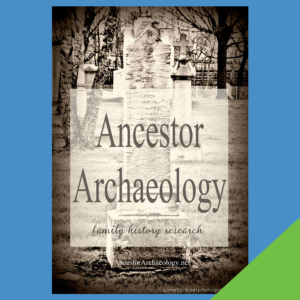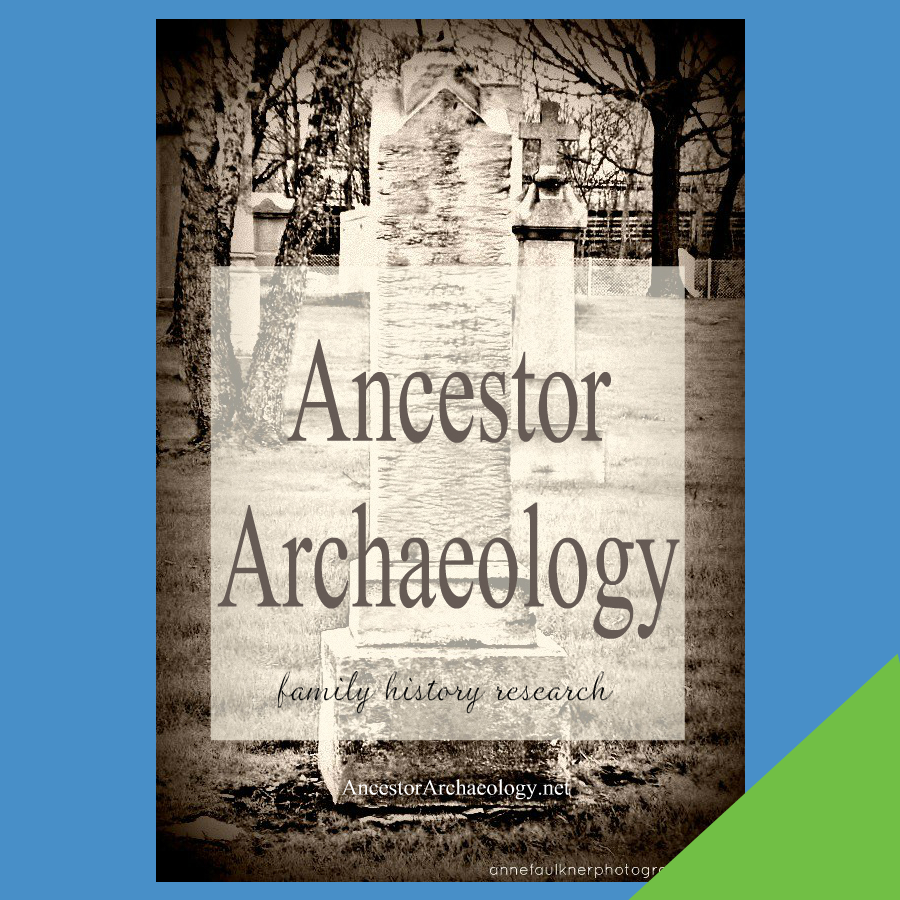 Anne Faulkner, blog author from the website Ancestor Archaeology, has shared this blog as part of our ongoing “How I Solved It Series”.
Anne Faulkner, blog author from the website Ancestor Archaeology, has shared this blog as part of our ongoing “How I Solved It Series”.
This blog explains how Anne was on a mission to sort out her Faulkner ancestors that led her down many paths and resources all the way back to the 1600s.
Confused. Irritated. Exasperated, even.
I had come so far. Traveled the long and winding road. Compass pointed to my True North. Or was it Ithaca? Or Brigadoon? Have the years of bleary-eyed research been for naught? Did I get just so close, only to be stonewalled, again?
Samuel Faulkner was NOT French …… was he? And, God as my witness, who the heck was Helen Murray? Somebody got some ‘splainin’ to do.
The original intent of the quest had been two-pronged. To prove or disprove the family tale, that our family descended from a Scottish Faulkner who immigrated to the Colonies in the early 1700’s. And to link the family to the mysterious will of William Faulkender, that I felt in my bones was that immigrant, but needed to prove.
Let’s lay out the facts. It’s the only sound way to look at this conundrum.
We don’t have to go back too far. And, perhaps we should just eliminate both Elizabeth Wilkin and Helen Murray since they were noted in books with no supporting documentation. Certainly another avenue of research, but not empirical to Finding Faulkner.
- Samuel Faulkner’s wife was Elinor.
- Samuel Faulkner’s sons were David, Robert, James and John M.
- Samuel Faulkner lived and died in Wallkill, New York.
- There was only ONE Samuel Faulkner (spelled Falkener) in Wallkill in 1790, 1800 and 1810. (There was NO Samuel Faulkner in Wallkill in 1820 – lining up with the 1811 date of death)
- The only Faulkners (spelled Falkener) listed in Wallkill in 1790 were a James, a William and a Samuel.
- William Faulkender’s will (abstract) dated 1783 listed sons: James, William Jr and Samuel.
I know. At this point it looks like I’ve done it. Right? It all looks good on paper. It all seemingly lines up. How can William Faulkneder NOT be the father of my Samuel? It could be that easy. Just say it is so, say I proved it, and walk away.
But I didn’t prove it. There was still the question of the last name. Faulkender vs. Falkener vs. Faulkner. And really linking the whole thing together. You know, wrapping it up. Bringing it home.
Now, I know spelling was quite random in the 1700’s. Many people were illiterate. There were a number of different languages being spoken in a small land area. Wallkill residents spoke Dutch, English, Irish, Scottish and French. That’s a lot of different accents, even if they all learned to speak English. Which circles back to my original theory. Say “Faulkner” in your best, thickest Scottish accent. Sounds a lot like Faulkender, doesn’t it?
So, who actually wrote the will? The original one. Not the abstract. Was it William? Mary, his wife? A neighbor, or some town official? If it was William, he’d certainly know how to spell his surname. And teach his children how to spell it too.
I needed to find that will. The original. Dang it. I needed to get to Albany, New York.
Shelving the quest, yet again, I began to hatch a scheme to get myself to New York……
Then it happened.
Sometime mid-March 2016 (you’d think I’d remember the exact date, wouldn’t you?) I decided to tool around on Ancestry and see if I could find something new. They had uploaded “New York, Wills and Probate Records, 1659-1999” a few months earlier (I was between subscriptions at the time) and I wanted to take a peek. When I opened William’s profile in Ancestry there was a new hint! From the wills collection!
Hands sweating, I held my breath and clicked on the image.
Disappointment. Again.
It was merely the handwritten transcript. Cool, sure, but not THE will. Intrigued, I knew I needed to do a good search of the records on my own, a better way to dig up records, anyway.
But wait ….. what was this? Off to the right, in the “suggested records” box? Another listing in the “New York, Wills and Probate Records, 1659-1999” One for a William H Faulkender.
Two questions ran through my head, William had a middle name? And, why hadn’t this hint showed up as well?
Clicking on it opened the Heavens and rained down the song of the Angels. (well, maybe not, but that’s how I remember it) It was THE will and probate packet. The ACTUAL packet. Eight glorious pages of original handwriting, signatures and all.
Along about page three of the packet, ‘Alice’s Restaurant’ lyrics came drifting into my head. “and there, there on the other side, in the middle of the other side, away from everything else on the other side, in parentheses, capital letters, quotated, read the following words:”
There it was. The signature. Or, should I say, the lack of signature. William was illiterate! (How often do you get excited about something like that?) He signed with an “X“. The will was written in the hand of James Caldwall, one of three witnesses. Oh, and it got better. The probate documents contained the signatures of the sons William, James and Samuel. They were not great spellers, but they could write. And guess what? Each man spelled his name differently!
| William Faulkender “X” signature on will |
| Wm Faulkner, James Faulknor, Samuel Fau?lner signatures on probate documents |
| Notation – not an “H” |
Additionally, only the body of the will proper contained the Faulkender spelling. The probate papers recorded William’s last name as Faulkner. And “H” was not his middle initial. It was a notation used throughout the will at the end of a line of text – perhaps a fancy hyphen. Transcription error!
Barring the discovery of the actual land deed Samuel signed in 1807 (ha!), whereas to compare signatures, or a time machine (I wish!), I feel this is as good as it gets. There were no birth certificates, no family photographs in the 18th century. No paper trail, as we know today, to prove lineage. I feel (mostly) satisfied, for now, to say that I have found what I was looking for. I have found Faulkner. And concluded the quest on American shores. Perhaps one day I will be able to continue the quest in William’s homeland, Scotland. And maybe even learn why and how he came to immigrate to the Colony of New York over 300 years ago.
And just exactly how the family name was spelled!
Looks like it’s time for a new quest!
If you have a story idea or a blog that you’d like to share as part of this series, please let us know about it in the comments.

